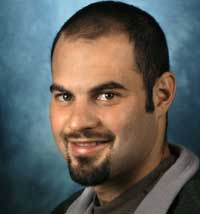
Peace Corps Volunteer Josh Kunin-Goldsmith says not once did he fear for his safety during crisis in Haiti
Rob Zaleski: View of Haiti called badly distorted
By Rob Zaleski
March 10, 2004
Not once did he fear for his safety.
That's the first thing Josh Kunin-Goldsmith wants me to know as he settles into his chair at a west side coffee shop.
Nevertheless, having spent the last week watching CNN reports of the ongoing bloodshed in Haiti, the 26-year-old Madison native says he now appreciates why his friends and relatives were so relieved when he and some 70 U.S. Peace Corps volunteers were evacuated from the tumultuous Caribbean country two weeks ago.
No question it's still a tense situation, says Kunin-Goldsmith, a graduate of Madison West High School and the University of Wisconsin-Madison, who'd just embarked on an AIDS project for the United Nations when rebels began their monthlong campaign that led to the ouster of President Jean-Bertrand Aristide.
But, he adds, the situation isn't nearly as chaotic as outsiders seem to think.
"I wouldn't say the media is exaggerating what's happening," says Kunin-Goldsmith, who has returned to his parents' home in Arbor Hills. "But it's focusing exclusively on the violence, which is still isolated in certain parts of Port-au-Prince (Haiti's capital) and other parts of the country. So even on the most violent day, 99 percent of the Haitian people are going about their daily business."
Even so, Kunin-Goldsmith - who'd just completed a two-year stint with the Peace Corps before accepting his United Nations assignment - clearly is saddened by what's occurred. Saddened, he says, because once again the world has been given a warped perception of Haiti as a nation addicted to mayhem and, as such, one that's virtually beyond hope.
Not true, he says. Not even close.
Haitians, he says, "are the most welcoming, hospitable people I've ever met. And I'd say that even in the last three months when I lived in Port-au-Prince I felt safer than I probably would in any major city in the United States."
But as dismayed and saddened as he is, Kunin-Goldsmith says he truly believes Haiti will be a better place now that Aristide has gone into exile in the Central African Republic.
In fact, though he considers himself a liberal Democrat, he strongly disagrees with Sen. John Kerry and other Democrats who say the United States was obligated to rescue Aristide because he was the first democratically elected president in Haiti's history.
Truth is, Aristide was a power-hungry despot who ruled with an iron fist and was no friend of democracy, Kunin-Goldsmith says. And anyone who's spent time in Haiti in recent years realizes that.
"He was a democratically elected leader who once had the popular support of almost the entire nation - and he wasted it," he says. "He wanted 100 percent control over everything. He managed to alienate just about everyone by cracking down on the press and engaging in human rights abuses and stuff like that."
And had the Bush Administration sent in troops to stifle the rebellion and attempt to prop him up, it would have created even more turmoil, Kunin-Goldsmith contends.
Whatever the case, Kunin-Goldsmith says that while Haitians aren't exactly thrilled by the presence of U.S. peacekeepers, they can't help but be hopeful about the future. That's assuming, he says, that the United States doesn't make just a half-hearted effort at nation-building and then take off - as it did after restoring Aristide to power in 1994.
"I mean, if there can be elections within six to nine months, and the $500 million of international aid that's been blocked is released, things can't help but improve," he says.
That's not to suggest Haiti will be a thriving democracy 15 years from now, says Kunin-Goldsmith, who hopes to return to the country as soon as the political situation cools off.
"But if there's enough investment in those next 15 years, it has a chance to start down the right road."
To be sure, many Americans question why we should even care about Haiti, Kunin-Goldsmith acknowledges.
What they fail to realize, he says, is that "culturally it's one of the richest countries in the world." Beyond that, "it's beautiful and has the potential to be a tourist's dream. It's got the art, the music, the beaches - the whole deal."
But even if you don't buy that argument, there's another reason we should all care about Haiti, Kunin-Goldsmith says.
If the Haitians run out of resources - which they almost certainly will without U.S. assistance - tens of thousands of them will end up on the shores of Florida.
"And then it's our problem."
E-mail: rzaleski@madison.com
Published: 9:55 AM 3/10/04
